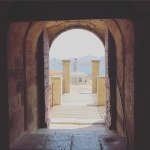Day 26: Château d’If #everydayadventure
Mere, my adventuring buddy from Amsterdam, and I took the metro to Vieux Port and then stood in line to buy boat tickets to If and Frioul, two islands off the coast of Marseille.
While waiting for the boat, we walked across the street to Amorino, a pricy-but-legit gelato place. Even the macaroons are filled with gelato!
[image error]
What could be better than gelato by the sea?
The boat ride to If was glorious but too short, unlike the 30 minute boat ride I took to L’Estaque two weeks ago. During that ride, every brilliant shade of the sea completely enchanted me. After that day, I wrote Heart at Sea, my favorite #everydayadventure blog post to write yet.
Still, I loved standing at the edge of the boat. Leaning against the rail, with the wind whipping my hair around my face, I watched the blue water throw giant waves up behind us.
[image error]
Mere and I (along with a crowd of tourists) stepped onto the shore with the fortress that was immortalized by Alexander Dumas’s great adventure novel.
If you are ever in Marseille, or even France (or Europe, for that matter), then I challenge you to boat, sail, or even swim to Château d’If. This ancient island prison/fortress is more than worth the 5 euro entrance fee.


We ducked into dozens of small prison rooms, with iron bars closing off the windows and rough stone walls marred by hundreds of years of graffiti. Even the soldiers used to carve their names into the walls. Tourists and visitors have scraped out or scrawled their own names on the walls too.
[image error]
I’ve never written my name on anything, not a stall door or school wall, but I couldn’t resist making my mark on a fortress that is now a literary legend.
It was exciting to explore the cramped prison rooms, where tiny square windows let in a piece of the sky and the sea.
Mere said, “If I was imprisoned here, I wouldn’t want to see that, to be taunted.”
But for me, if I was locked away in a tiny stone room, I’d need every inch of sky I could get. I’d need the streak of deep blue sea. It would be better to glimpse an unattainable freedom than to stare at walls carved with the names of prisoners who came before.
Usually, if a door is shut, I leave it shut. But something about this prison woke me up. When we visited the room, due to the Count of Monte Cristo book, where a tunnel was carved from one prison cell to another, I stepped over the simple rope marking off the entrance to the tunnel.
For a few seconds, I crept up to where the prisoner would’ve crawled through from one wall to the other.
I seriously considered poking my head or hand out of the hole so I could freak out the tourists taking pictures in that other room, but I decided to spare them. This time.
We went up the stairs to the roof, to middle of the slightly domed surface. Tile spiraled out from where I stood. Towering above the fortress and the sea, I felt like a queen.
Mere and I found a small hidden garden. Part of it was touristy, with a small gardener cabin. But I climbed the few stairs to the next level and pushed open the door to another gardening area. This time modern tools were mixed in with the old wheelbarrow and shack.
During our exploring, we found a door in the wall that encircled the grass around the fortress. I stepped toward it, but one of the gardeners shook his head.
“No?” I asked, pointing at the door.
“No, no.” He shook his shovel at me. “Open door, you fall. You fall.” He motioned with his hands and pointed out at the sea.
I laughed, “Okay. Merci! Merci!” And we kept exploring. But later, when our boat spun around the island, I watched for that door in the wall. It did open abruptly toward the sea, but there was a narrow staircase carved into the side of the cliff. The staircase wove down toward the sea.
We took the boat to Frioul, a long island spread out behind If.
When we reached the shore, Mere and I studied a map of the island, pretending to understand how to get to a beach. The sun was at full blast. Today was exceptionally hot and a half hour hike to a beach didn’t seem worth it. Or even doable.
But then we saw our answer: one of the small tourist trains. Literally called “Le Petit Train,” this train is tiny and very tourist-y.
I’ve been on trains before, but apparently it helps when the train is attached to an actual railroad, instead of jostling down unpaved island roads.
I sat, expectantly waiting for a calm scenic ride to the beach. But from the second the train started, it raced and seemed to bounce up the road. I laughed, clutching the seat in front of me, as the train careened around the edge of a cliff and raced down the hill.
Mere tried to take pictures or a video, but the train was so bouncy that she couldn’t get a steady shot. At all.
It was crazy and fun, and even a little scary. Not emotions I would’ve connected to a “petit” tourist train.
The train finally jerked to a stop by a crowded beach, where there wasn’t much sand, and the sand that was there was already sectioned of by strangers, towels, and flipflops.
My stomach felt a little sick after our train ride. I ordered a chilled can of Orangina, which helped. We changed and threw our towels on a section of rocky beach. The beach seemed overrun with mossy stones.
Mere and I winced and laughed as we painfully picked our way toward the sea. I’m sure we were entertaining enough for the people watching from the beach.
Eventually, after we fought our way back out of the cool water, we found a tiny section of sand and staked our claim, despite the boisterous family crowding around us. One of the little boys kept filling a plastic cup with sea water, then waddling back and tossing it on Mere’s leg. One of the adults leaned over me, kicking sand across my towel, as he reached for a bag of food.
It was . . . cozy. But we were laying on soft thick sand (not on a pile of rocks), so I didn’t complain.
After another hour, we boarded the ship and stood at the railing until the ship pulled into Vieux Port again. On our way, we passed another boat from the same company. The boat slid up next to ours as it passed.
I dramatically blew a kiss at the people standing by the railing, and one of the guys blew a kiss back. It made me laugh.
Sidenote for Alexander Dumas fans: their boat’s name was Edmond Dantès.



